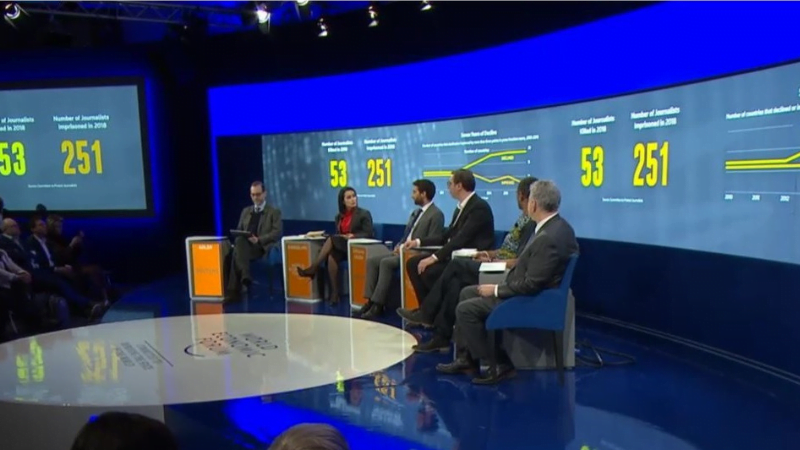Journalists have to investigate corruption when all else that has come before them has failed, and they would not have to die if the rule of law were in place, said the son of assassinated journalist Daphne Caruana Galizia at the World Economic Forum (WEF) in Davos.
Caruana Galizia, whose mother – one of Malta’s foremost investigative journalists – was assassinated in a car bomb a few metres outside her home in October 2017, said that this happens when institutions meant to uphold democracy have been strangled and compromised.
Caruana Galizia was a member of the panel in a debate on media crisis and the threats to journalists. Panel members included Martin Banon, executive director of the Washington Post whose columnist Jamal Khashoggi was brutally murdered in Istanbul, Turkey.
It is the first time that press freedom has taken centre stage at the WEF with a debate chaired by Reuters’ editor-in-chief Stephen Adler.
“My mother was investigating cross border corruption. If the institutions were doing their job, then she would have never had to investigate this and she would not have had to put her life at risk. She would never have been murdered. It’s a sign of institutional collapse,” Caruana Galizia said.
The debate focused on the increased vilification of journalists and the threats they face. In 2000, 81 journalists were imprisoned, but 250 are behind bars today, according to Freedom House statistics.
“That’s three times as many. These days, a burst of nationalism and authoritarianism has led to more vilification of the press, including by the US President,” Adler said.
He referred to the killing of Khashoggi in Istanbul, and Daphne Caruana Galizia in Malta, as examples of the risks that journalists face. Only 13% of the world’s citizens live in countries with a free press.
Caruana Galizia said that before Davos considered ‘Globalisation 4.0’ as the theme for its annual meeting, it had to assess what the previous phase had contributed:
“I don’t think that there was a functioning system in the first place. What Globalisation 3.0 did was create a global playground for crime and corruption. We simply never had the tools to fight it, which is why we are falling back to the investigators of last resort, our journalists. It is also why they are being murdered. Politicians are safe; it’s all falling on the shoulder of journalists”.
The phrase ‘let’s protect journalists’, he said, hides the root cause of the problem. “What could we have done to protect Khashoggi? Build a wall around him so Saudi Arabia can’t ever get to him? Of course not. That’s not a way to live; not for him, not for anyone else. We don’t want this kind of peaceful coexistence where journalists say what they want, and corrupt politicians do what they want. We don’t want this kind of dirty deal. What we want is the rule of law,” he said.
Institutions need to be effective, Caruana Galizia said. When journalists report a story about corruption and it is very clear who the actors are and the evidence is in the public domain and nothing happens, trust in journalist’s work is destroyed if no prosecutions occur. The situation benefits the corrupt, not the public interest.













